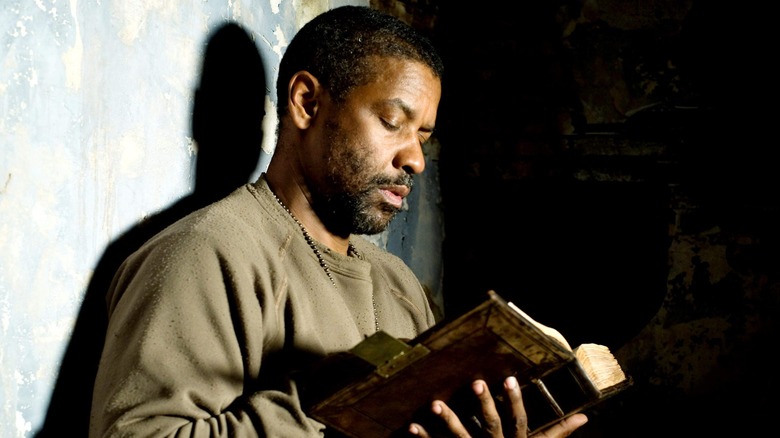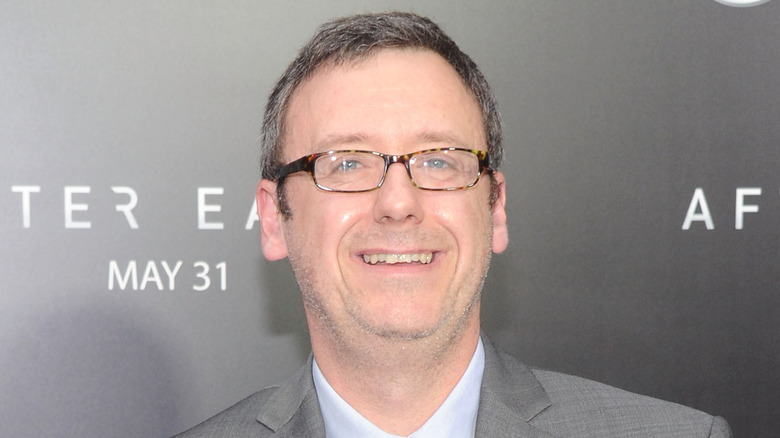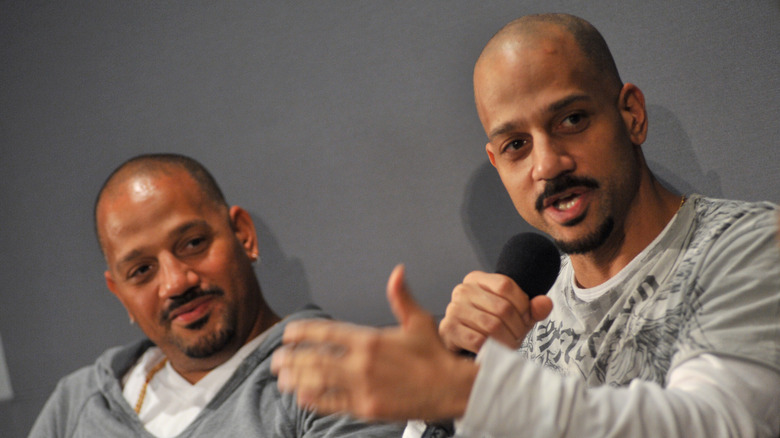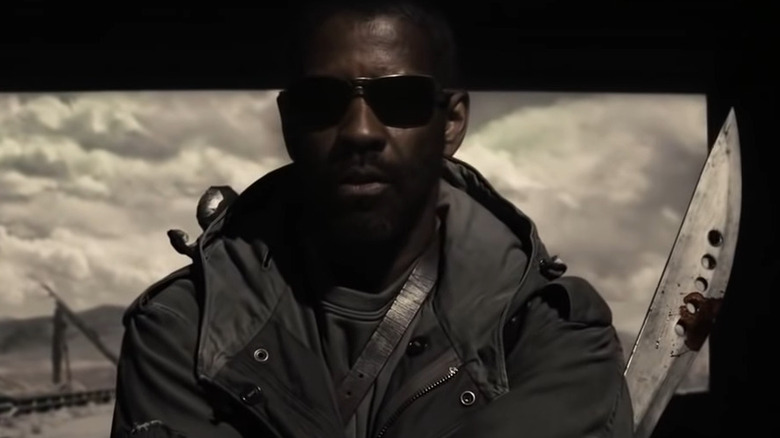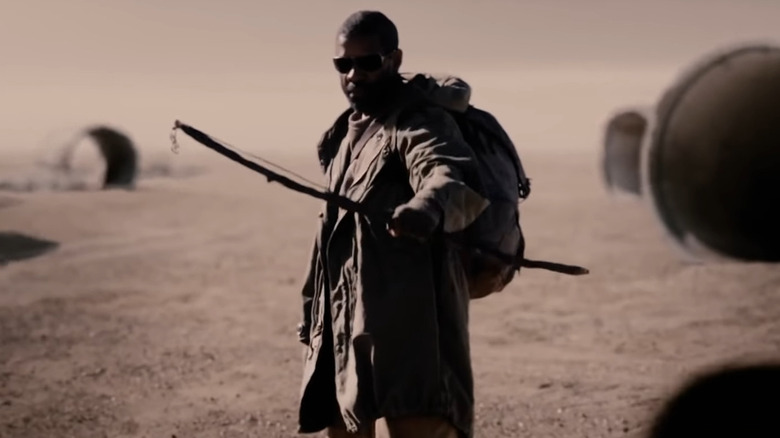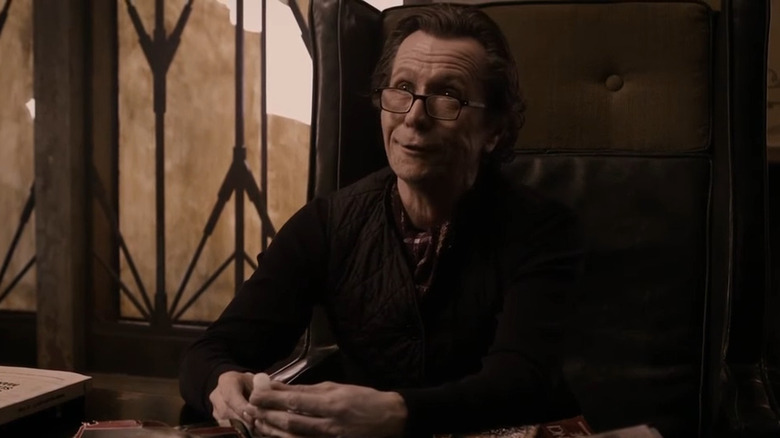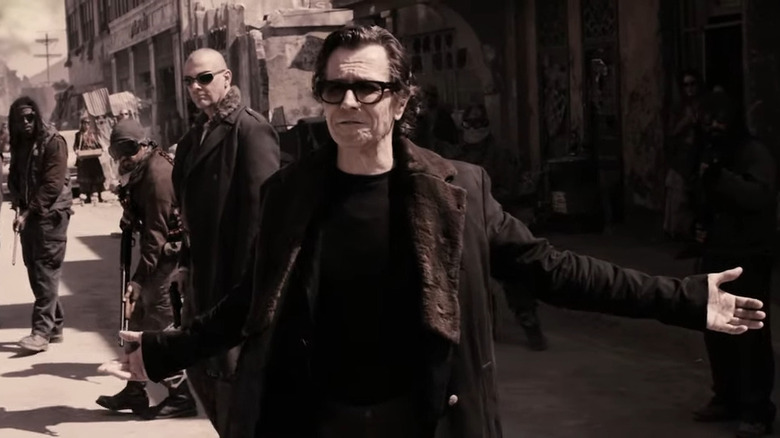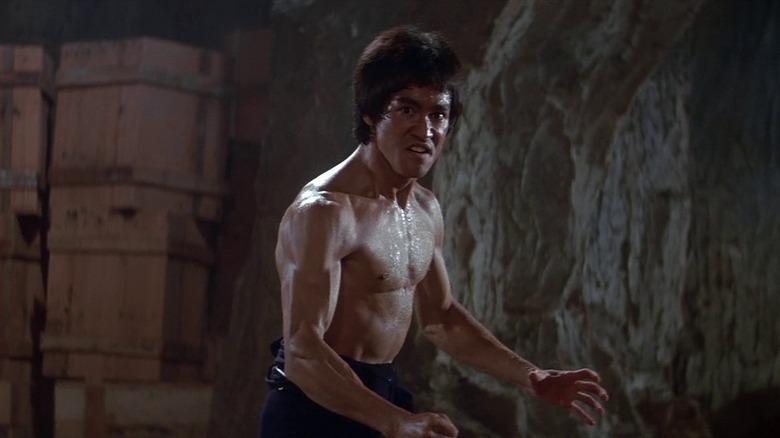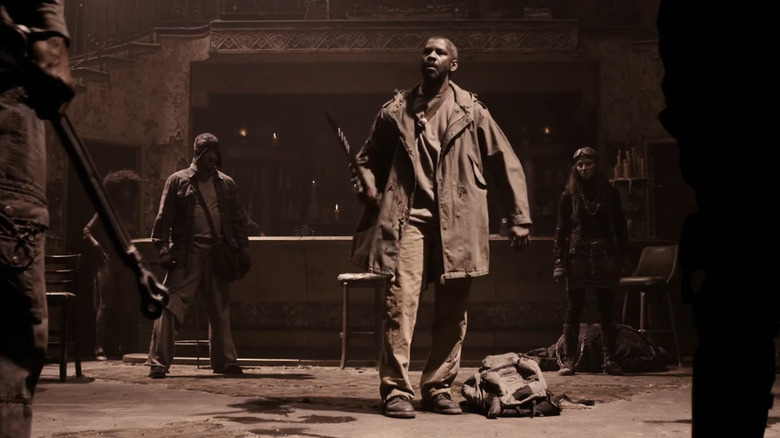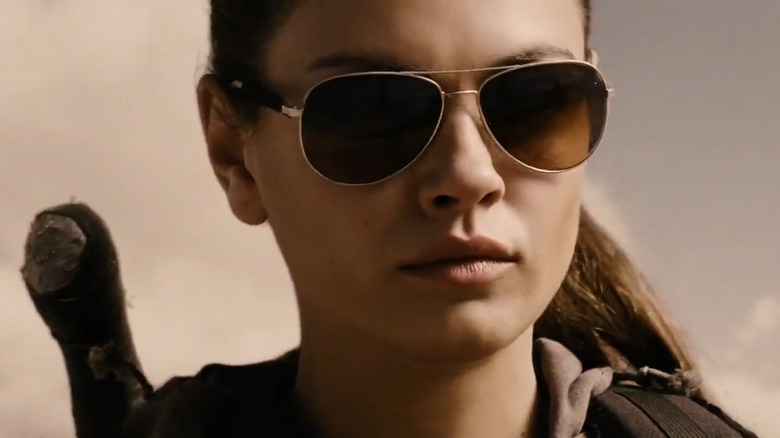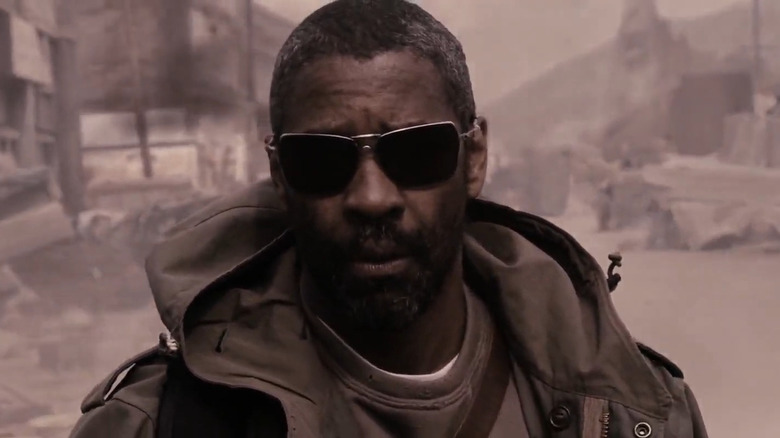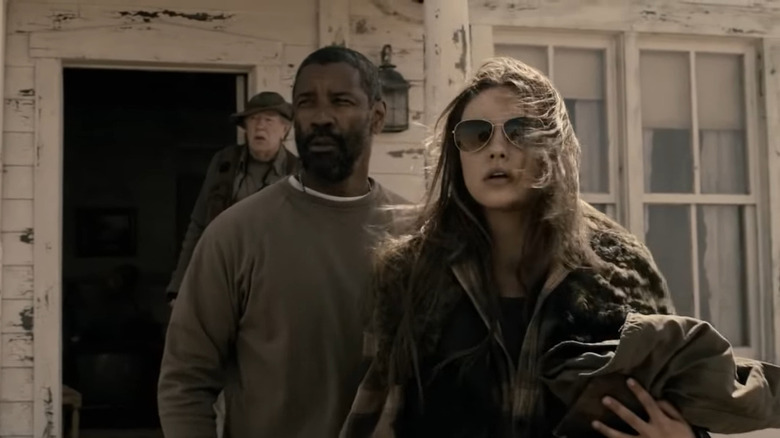The Untold Truth Of The Book Of Eli
Released in 2010, "The Book of Eli" contains a mix of violent action and spiritual rumination that works so much better than anyone might assume. Brothers Albert and Allen Hughes directed the film, and their unique artistic vision combined with their willingness to collaborate with others behind the scenes elevate an already powerful script into an unforgettable action movie.
The film stars Denzel Washington as the titular Eli, who's been wandering the American landscape for decades, ever since a mysterious event thrust humanity into a post-apocalyptic nightmare. Eli is on a journey to deliver the last copy of the Bible to a safe place, but his path is constantly obstructed by environmental dangers, roving bandits, and power-hungry dictators like Gary Oldman's Carnegie.
"The Book of Eli" is one of those rare films that has something for everyone. It combines atmospheric worldbuilding, fast-paced action sequences, and stunning performances with a story that goes so much deeper than its surface appeal. The film is every bit as relevant today as it was in the 2010s, which makes now the perfect time for a revisit and a deep dive into its untold truth.
Gary Whitta wrote the original script in six days
Before creating "The Book of Eli," Gary Whitta primarily wrote for video games. He wrote the script for both the 1990 video game adaptation of "Back to the Future II" and the 2006 game "Prey." There's obviously a huge difference between writing for a game where the audience is actively involved in the story unfolding and writing for a film that needs to do all the heavy lifting on its own, and Whitta learned that lesson the hard way. In a 2010 interview with Done Deal Professional, Whitta explained that while writing a yet-unproduced film called "Reaper," "My approach was awful." Whitta put outlining to the side, dove straight into writing, and almost immediately ran into story problems.
In that same interview, Whitta discussed how his process changed when he began writing "The Book of Eli." Whitta said he created a one-page sheet outlining the plot beats and a few essays about Eli's character and the film's themes. With those materials as a solid base, he found that actually writing the script became much easier. "I had a first rough draft finished in about six days, writing about 20 pages a day," Whitta said. Whitta had some concerns about the marketability of an action-heavy yet deeply spiritual post-apocalypse movie, but they turned out to be unfounded.
The Hughes brothers jumped on it immediately
Albert and Allen Hughes are the directorial duo behind "The Book of Eli," and they had a world of experience between them when they took on the film. In 1993, they released their first film, "Menace II Society," and they followed that up with 1996's "Dead Presidents" and a 1999 documentary called "American Pimp." Immediately before working on "The Book of Eli," the brothers adapted Alan Moore's graphic novel "From Hell" for the big screen in 2001.
In some ways, the brothers were unlikely candidates for developing Gary Whitta's screenplay. In an interview with Vanity Fair, Albert admitted that he's an atheist, and Allen said that he doesn't identify as a Christian. But despite the film's biblical themes, they were drawn to it almost immediately. Allen said that he was excited by the film's logline and decided to read the script the moment it landed on his desk, even though that's something he almost never does. When he read the line from Gary Oldman's character about the Bible being "a weapon aimed at the hearts and minds of the weak and the desperate," the hair stood up on the back of his neck, and he knew that he wanted to work on the film. The brothers grabbed the opportunity as quickly as possible and got started making the film a reality.
Denzel Washington's son talked him into the movie
Denzel Washington became a co-producer and star of the film, but without his son, future actor John David, that might never have happened. According to Washington, by the time "The Book of Eli" came around, he was already predisposed to taking his son's advice when it came to movies. In an interview for Female.com.au, Washington said that his son had talked him into taking his Oscar-winning role in "Training Day," which turned out to be a success. In the years since then, Washington's son learned even more about the film industry, and when it came to "The Book of Eli," he was even more excited than he'd been in the past.
In the interview, Washington explained that John David was particularly drawn to the spiritual aspects of Gary Whitta's script. "He really got his teeth into this story," Washington said, "and he's a very, very spiritual young man and a unique individual. He got behind, and he wouldn't take no for an answer. ... And I really took a closer look at it." Obviously Washington agreed to take the part, and though the reviews for "The Book of Eli" can't exactly stand up next to those of "Training Day," there's little doubt that his son made the right call convincing him to step into Eli's shoes.
Denzel Washington reworked the script
From the very beginning, Denzel Washington worked on "The Book of Eli" in a hands-on way that goes above and beyond what a typical star and producer might do. In an interview with Collider, Washington said that he started working with the Hughes brothers well before they were even close to filming. The three of them spent almost six months just focusing on the script, making changes and adjustments to try and get the best possible version of the story to come through. During that time, Washington said, "I would sort of play all the parts and read them out loud," allowing everyone to get a clear sense of the dialogue and what changes were needed for it to be perfect.
Along the way, the team also stayed in contact with the film's original screenwriter Gary Whitta (via CBR). Whitta had already done rewrites in the process of getting the film sold to Warner Bros., so the prospect of more changes meant there was a chance that the final film went in a vastly different direction than what he'd envisioned. Luckily, that wasn't the case. "I have the rare privilege of being able to look at the finished film and absolutely recognize it as the film that I wrote," Whitta said. It was Whitta's vision that inspired everyone who worked on the film, so it's great he was satisfied with what they created, though that may be a rarity in Hollywood.
There weren't many rehearsals
Denzel Washington and Gary Oldman were both already familiar with their own processes for getting into character by the time they arrived on the set of "The Book of Eli," so when it came to formal rehearsal, the two of them took a laid-back approach. Oldman told Tribute Movies that much of their "rehearsal" time wasn't spent working with the screenplay at all. As the actor explained, "You know, sometimes you can sit around and tell anecdotes and laugh and drink coffee and not even touch the script ... and yet you are working on the script."
In between the laughing and the lack of usual rehearsals, the two talked about the characters and what was supposed to happen in their scenes together. And that lack of real rehearsals might have played in their favor. After all, Washington's Eli and Oldman's Carnegie are strangers who quickly turn antagonistic, so too much familiarity with each other might have undercut their relationship in the film. That doesn't mean it was a perfect approach for everyone involved, however. Oldman also said, "I got the feeling I like maybe more rehearsal than Denzel," but that didn't stop him from just going with the new process, and that ultimately worked. Whatever problems "The Book of Eli" may have, the performances of its leads aren't among them.
The Book of Eli set was very collaborative
Making a movie always involves collaborating with a group of creatives, but the Hughes brothers were even more open to input from their actors than most other directors. Working with the brothers as a co-producer on the film, Denzel Washington didn't just have an impact on the script — he also helped to come up with specific character details about Eli, like a burn scar on his back that Washington imagined as being the remnants of some conflict Eli faced after the disaster that ended society (via Emanuel Levy).
When it came to Eli's nemesis, Carnegie, Gary Oldman had more creative control over the character than actors are sometimes allowed. He told Tribute Movies that because the script didn't include a highly detailed description of Carnegie, he stepped in with his own ideas, telling Allen Hughes, "Look, I'm the guy with the water and the soap." As a result, Carnegie's clean-shaven appearance, and even his clothing choices, came from Oldman.
Oldman also elaborated on how collaborating with the Hughes brothers went beyond helping to design a character's look. After one day of shooting, Oldman had some thoughts about his performance in a particular scene, and he wanted to try it again the next day, and he said, "They were absolutely open to it and allowed me to do it, which is rare." The Hughes brothers know that sometimes good directing means taking input from multiple sources.
Bruce Lee had an impact on the film
Bruce Lee died in 1973, but his legacy still lives on, and his influence continues to work magic — even on modern movies. Dan Inosanto (who's been involved in projects like "Big Trouble in Little China" and "Escape from L.A.") is one of the martial artists who helped train Denzel Washington for his fights in "The Book of Eli," and in an interview about the film, he talked about how Lee's ethos still impacts his approach to the work. As he put it, "[Lee] tried to make it as realistically yet entertaining as possible." In practice, that means that actors need to be pretty thoroughly trained in real martial arts practices.
Luckily, Inosanto wasn't alone in getting Washington ready for the role. He and fellow martial artist Jeff Imada (who's worked on "Bullet Train," "Furious 7," and "The Bourne Ultimatum") were responsible for developing Eli's fighting style and finding a way to teach Washington the moves. Imada said that, "Eli has a very street-oriented style of fighting," one that's likely been influenced by years of facing off against competent foes. Eli's mixture of formal moves and on-his-feet improvisation is what has kept him alive through the long years of his journey.
Denzel Washington took doing his own stunts to a new level
Denzel Washington's preparation for the role of Eli went beyond helping to rework the script and learning his fight choreography. Washington told Tribute Movies that he initially had to lose about 50 pounds over the course of six months so he could look the part of a roving apocalypse survivor. Along the way, he learned some street fighting and martial arts techniques and went through extensive weapons training so he could wield every gun, bow, and grenade that Eli uses to stay alive on the road.
The Hughes brothers wanted every fight in the film to feel as visceral and realistic as possible. That often meant that Washington was doing his own work every step of the way. "This is beyond doing your own stunts," Albert Hughes said of Washington's performance, "this is doing your own fights, hitting every mark, and making sure it looks real." Allen Hughes added that what makes Washington's work in this film different from others is that he's actually performing the fights, even during takes that stretch to a minute and longer.
It wasn't just the film's directors who noticed how dedicated Washington was to this particular role. His co-star Gary Oldman said in a Tribute Movies interview that he was incredibly impressed with Washington's dedication to his physical performance. The fight scenes are some of the stand-out moments in "The Book of Eli," and it's largely due to Washington himself that they remain so memorable.
Graphic novels inspired the film's look
"The Book of Eli" is as packed with fight scenes as it is with stunning shots. In under two hours, the film manages to build a post-apocalyptic world that feels unnervingly real and lived-in. Much of the film's success in creating that universe is due to the work of the Hughes brothers. In an interview with Emanuel Levy, they opened up about their worldbuilding process.
Allen Hughes said that the two of them did a whole lot of research. "We researched material about the likely impact on the environment, whether from a nuclear or biological assault or even ash from a super-volcano," the director explained. Though the movie doesn't commit to a particular event that ended the world, the brothers wanted to understand what different events would look and feel like, as well as how people could go about surviving in the wake of various catastrophes.
On the other hand, Albert Hughes said that the look of their film was also inspired by graphic novels, explaining, "We used comic book artists Tommy Lee Edwards, Chris Weston, and Rodolfo Dimaggio to help us arrive at the overall look of the movie." Those inspirations helped the brothers plan the colors, sets, and landscapes that they wanted to use in the film. From there, the duo used extensive storyboarding to make sure that they and everyone else working on the film knew what they were going for in every shot.
The Book of Eli was shot on location
The use of real locations in "The Book of Eli" really helps the film stand out. The movie was shot in New Mexico, so a real desert simulates the post-apocalyptic landscape throughout much of the film (via Collider). A real location also comes with real challenges, like intense heat and unpredictable weather, and every actor had a different reaction to that experience.
Gary Oldman told Tribute Movies that he felt being on location really did help a lot. It allowed him to fully immerse himself in the character and the scene, though he admitted, "It's always nice at the end of the day to get in that car, go back to the hotel, and shower."
Mila Kunis could definitely relate to Oldman's relief at the end of the day. "The hardest thing for me was actually shooting in the weather," she told Collider. She said that growing up in the city didn't prepare her for working in the middle of nowhere, contending with intense winds and desert heat.
Contrary to the opinions of both his co-stars, Denzel Washington said, "It wasn't that bad." According to him, when the weather got to be too much, he and the other actors were always free to step into their trailers.
Balancing spirituality with action was a challenge
The epic action sequences and the stunning scenery are two of the biggest components of what make "The Book of Eli" work, but its story undeniably has a spiritual element that helps the film stand out among a crowded field of violent Hollywood popcorn flicks. For the Hughes brothers, that spiritual element is the core of the film, but it's also something they were very conscious of restraining, lest it overwhelm everything else that's happening on the screen. In an interview, they said that editing the movie was complicated, explaining they didn't want it to feel overly religious or corny.
They ultimately struck a balance that lets the film be enjoyed by a broad audience and allows everyone to walk away with a slightly different message. Denzel Washington told Female.com.au, "I embraced this primal and spiritual aspects of this story and of this man and how the 'Word' can be manipulated." For him, the film is about the spiritual journey all of mankind is on. His co-star Mila Kunis views the film in a different light. "I did not look at it as a religious film," she told Collider, adding, "I looked at it as a film of faith and a film of hope." More than anything, it's the film's careful balancing act with its themes that help it to stay relevant years later.
